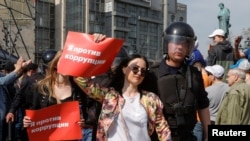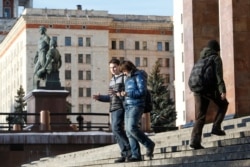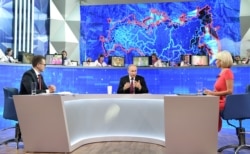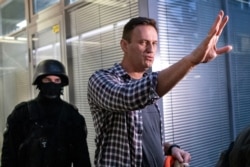New reports from Transparency International and the Russian Academy of Sciences on education highlight a pervasive culture of corruption in Russia that persists despite efforts by the government and opposition activists.
The country scored 137th out of 180 countries in the Transparency International corruption index published last week.
Every year we have to find new words to describe the same thing,” Anton Pominov, the organization's Russia director, told VOA.
"Russia tries to introduce anti-corruption measures without any will to implement them, without understanding why they should be done,” Pominov said.
Meanwhille, recent attention has focused on Russia’s education system; the Academy of Sciences investigation made international headlines this month when it found widespread plagiarism in Russian academic journals, with more than 850 articles rescinded from 263 journals after an initial review. “
"There will be more papers retracted,” said Andrey Zayakin, a physicist who served as the scientific secretary of the commission issuing the report.
"We didn’t have enough time to read and systemize the responses before our… deadline,” he told VOA, adding the commission had requested more than 2,000 retractions.
He said the worst offenses are driven by "dissertation mills" selling academic writings and a market that rewards government funding for published works.
A recent university graduate in Moscow who began writing academic papers for other students to make extra money told VOA she would tailor each paper for the target university, "even the professor.”
According to Dissernet, a volunteer group that works to expose Russian academic corruption, plagiarized works have emerged as a routine way for Russians to jumpstart careers in politics, medicine, academia, and law.
Using algorithmic software to spot dissertation copies, Dissernet routinely exposes prominent figures for having established careers without qualifications or, apparently, consequences. “
Some members of the state Duma actually do have diplomas that are nothing more than a printout on some beautiful paper conferring a degree to them in the name of some nonexistent academy of science or nonexistent university,” said Zayakin, who has also worked with Dissernet.
Dozens of online services warn clients of poor quality fakes when offering a selection of insta-degrees from Russia’s universities.“
Our main priority is quality-made reproductions from the most basic document to diplomas for doctors of science,” touts a website advertising degrees.
"Now there’s no need to spend 5 years to get into the profession of your dreams…."
An issue for the ages
Corruption has vexed Russia for centuries and the labyrinthine Soviet bureaucracy and constant shortages created a culture of kickbacks to get around the USSR's ubiquitous shortages of consumer goods. Post-Soviet Russia saw the rise of oligarchs and a “wild east capitalism” with few rules and threats of violence amid tumultuous political times.
Elements of all of these have found their way into President Vladimir Putin's Russia despite frequent pledges from Putin, now in his 20th year in power, to tackle the issue. “
"I, of course, feel responsible for this mess,” said Putin when asked about his role on corruption during a televised question-and-answer show with the public last year.
"Where does the money go? To public revenue, to be sure,” Putin added when asked about common bribes. “Of course, officials, and representatives of law enforcement in particular,” he added.
While corruption's full economic effects are difficult to calculate, conservative government estimates put the cost of corruption at $2.5 billion from 2014 to 2017.
Entrepreneur's Rights Commissioner Boris Titov has labeled the issue the “biggest problem” facing Russian entrepreneurial growth.
Yet Putin has insisted harsher punishments and “uncompromising efforts” are changing the tide.
Among Putin measures lauded by outside experts are e-governance efforts and a public blacklist of government officials fired over a “loss of confidence.”
State media portray Putin as something of an anti-corruption folk hero, seemingly alone trying to rein in Russia’s vast network of amoral civil servants.
A popular improv sketch show famously runs skits showing Putin lambasting terrified corrupt officials with a sudden appearance and kick in the pants, and the All Russia People'sFront, a Putin-linked political coalition, published a series of animated videos showing Putin catching and graphically executing corrupt regional politicians.
Meanwhile it’s not uncommon to see salacious state media TV reports detailing sting operations against governors, policemen and bureaucrats, often caught holding bags of cash.
The Navalny factor
However, the Anti-Corruption Foundation, run by Russian opposition leader Alexey Navalny, says these efforts distract from more significant graft within the Kremlin itself.
The group, which goes by its Russian acronym FBK, has skewered Kremlin insiders and ministry officials in a series of high-profile investigations into their illicit and often exorbitant holdings despite modest government salaries.
"A real fight against corruption is impossible under Putin. His whole system is built around it,” the organization's spokesperson Lyubov Sobol told VOA. “
Every attempt to really take on corrupt officials has ended in nothing,” she said.
Secret European villas, wealthy relatives, and private planes ferrying pet corgies to international dog shows have all been subjects of the foundation’s video investigations in recent years. Another alleges to have uncovered the secret wealth of former Prime Minister Dmitry Medvedev and garnered over 33 million YouTube views.
The revelations set off a series of nationwide protests last year and may have played a role in Medvedev’s dismissal in Putin's Kremlin shakeup last week.
FBK was also quick to note that Medvedev replacement Mikhail Mishustin has family holdings that far outstrip his past government salary as Russia’s chief tax officer.
Meanwhile, the Kremlin has launched raids and criminal investigations against FBK, moves widely seen as revenge for the organization’s investigations and calls for democratic change.
A poll last year by the independent Levada Center found most Russians view anti-corruption crackdowns as aimed at settling political scores.
Sobol said the solution is independent judges and a reformed police force, but added, "for that you need political will.”







